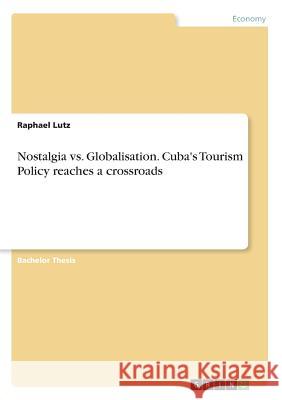Nostalgia vs. Globalisation. Cuba's Tourism Policy reaches a crossroads » książka
Nostalgia vs. Globalisation. Cuba's Tourism Policy reaches a crossroads
ISBN-13: 9783668313682 / Angielski / Miękka / 2016 / 88 str.
Bachelor Thesis from the year 2016 in the subject Tourism, grade: 1,7, University of Applied Sciences Saarbrucken (Wirtschaftswissenschaften), language: English, abstract: Cuba - an island full of contradictions: the people are poor, but happy; the socialist regime takes care of every Cuban, but puts the money into the own pockets while the people have nothing; Fidel Castro once named the tourism as -the evil we have to have- but in fact, tourism became the last resort for the economy of the whole country. Today, his brother Raul Castro is the face of the -Partido Comunista de Cuba- (PCC), the only party in the socialist country and also President of the country. But concerning the political orientation, nothing's changed - at least de facto. In fact, the change of the political leadership from Fidel to Raul was a signal for the Western societies to start a new dialogue with the isolated country. After Barack Obama's election as President in 2009, both nations showed willingness to approach each other. The slow but steady reconciliation of the two archenemies was noticed worldwide and led to a further increase of Cuba tourists, especially from Europe, but also more and more from the USA. Due to the great importance of the tourism sector for Cuba, this development seems to be absolutely positive. But the progressive mass tourism creates more and more problems due to a lacking adequate touristic infrastructure. Furthermore, the masses of foreign tourists menace the long-term preservation of Cuba's traditions and identity. In this thesis, I will analyse Cuba's tourism policy of the past, of the present and possible developments in the future as well as the consequences for the involved actors: the local population, the tourists, the involved foreign and domestic travel companies and the political decision-makers.











